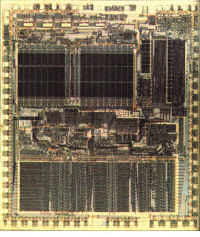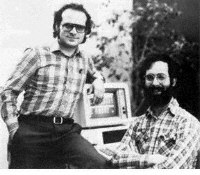 Motorola 68000
Motorola 68000
|
|
Components
The Motorola 68000 microprocessor exhibited a processing speed far greater than
its contemporaries. This high performance processor found its place in
powerful work stations intended for graphics-intensive programs common in
engineering.

|
|
|
 Bob Frankston and Dan Brinklin
Bob Frankston and Dan Brinklin
|
|
Software & Languages
Harvard MBA candidate Daniel Bricklin and programmer Robert Frankston developed
VisiCalc, the program that made a business machine of the personal computer,
for the Apple II. VisiCalc (for Visible Calculator) automated
the recalculation of spreadsheets. A huge success, more than 100,000 copies
sold in one year.

|
|
|
 Stanford Cart
Stanford Cart
|
|
Robots & AI
In development since 1967, the Stanford Cart successfully crossed a
chair-filled room without human intervention in 1979. Hans Moravec rebuilt the
Stanford Cart in 1977, equipping it with stereo vision. A television camera,
mounted on a rail on the top of the cart, took pictures from several different
angles and relayed them to a computer. The computer gauged the distance
between the cart and obstacles in its path.

|
|
|
 Introduction to VLSI Systems
Introduction to VLSI Systems
|
|
Components
California Institute of Technology professor Carver Mead and Xerox Corp.
computer scientist Lynn Conway wrote a manual of chip design,
"Introduction to VLSI Systems." Demystifying the planning of very
large scale integrated (VLSI) systems, the text expanded the ranks of engineers
capable of creating such chips. The authors had observed that computer
architects seldom participated in the specification of the standard integrated
circuits with which they worked. The authors intended "Introduction to
VLSI Systems" to fill a gap in the literature and introduce all electrical
engineering and computer science students to integrated system architecture.

|
